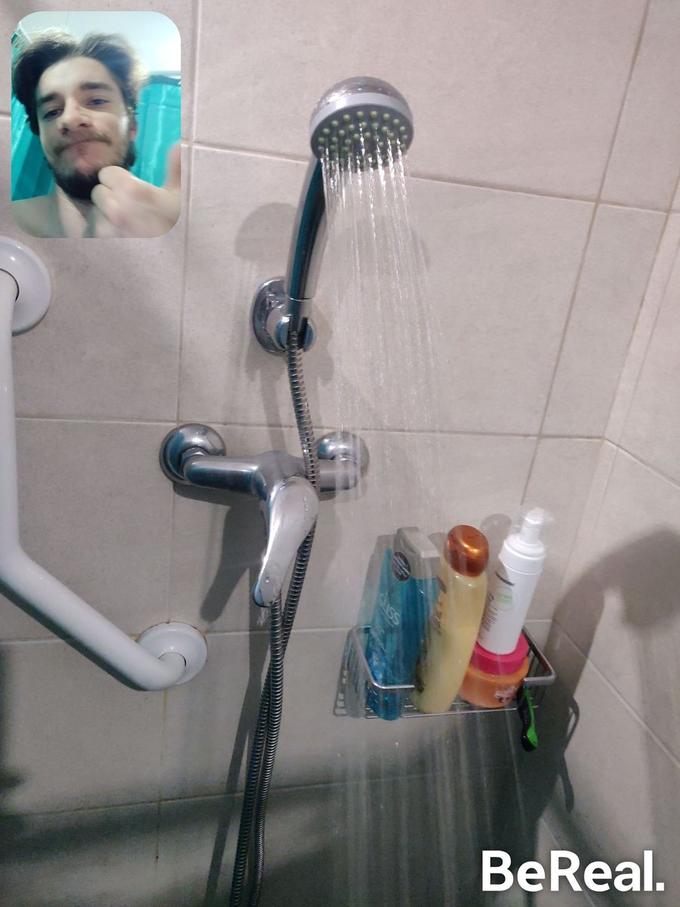Meme insider
BeReal And The Gradual Memeification Of Ourselves
We have known for a long time that social media is full of lies. Our ability to spot them might be shaky sometimes, but we all remain complicit in the idea that a little bullshit only hurts somebody occasionally.
It makes the explosion of a platform claiming to disavow this a gimmick before it even tops the App Store chart. BeReal has been making waves for encouraging its users to do exactly as its name suggests. A mixture of random, urgent notifications to share the moment and selfies in the dark have ensured, at the very least, that the warning sign emoji will never be looked at in the same way again.
For many, the current popularity of BeReal is a natural evolution of a tentative, but long-held desire among the coveted Gen Z audience (and some of their more switched-on elders) for a convenient way to express the messy reality of life through our phones. Instagram, TikTok overshares or even the heyday of the quirky Snapchat screenshot have all been used with this kind of intent.
However, none compare to the much talked about mundanities that are BeReal’s USP. “Oh, you’re in bed? Great, me too, and now I feel way less guilty about it,” as one lowdown in the Evening Standard put it. It’s boring yet relatable, with the occasional flash of more engaging content to break up the soothing monotony.

Arguably, this doesn’t make it as different from other places to share content as it would like to be. Most of us know the kind of clichés we expect from remade over and over by different acquaintances in our Instagram feed, for example.
Of course, this is likely intentional, with Platformer’s interpretation of the space as somewhere which “combines a nostalgia for the social apps that came before with an anxiety about the world those apps created.” Playing Wario to the platforms we know and have complicated relationships with, it appeals to our inner troll, and scares it a little.
One thing it has in common with pretty much every other type of social media is that its users are finding ways to subtly subvert the intended experience. While it may make it a lot harder to engage in personal brand building, it does allow for moments of temporary notoriety, some of which are more manipulated than others.

Gen Z research firm dcdx point to the TikTok trend that shows users who have "won" BeReal by their post being timed to when they’re doing something particularly outrageous. Some have achieved their five minutes of fame by blindly following their notification when it pops up at an inappropriate time, e.g. their grandma’s funeral.
@juicyy.lucy #greenscreen ♬ original sound – Ian Asher
It encourages a philosophy that has dominated social sharing apps since their inception, the She's So Crazzzzzzzy Love Her mindset where we try desperately to prove ourselves as interesting and amusing while trying to retain some nonchalance in the process.
That said, BeReal has been born into a culture in which most are self-aware of this process. Its combining of freeform expression via a highly structured user experience has cleared the way for a slew of free promotion in the form of memes.
A way in which BeReal does separate itself from its predecessors is the ease of meme creation that uses the features of the app itself. It’s hard to think of a social media platform before this whose basic framework has lent itself so easily to this formatting.
The selfie/scenery juxtaposition that an increasing number of people have become accustomed to has undergone countless remixes, covering everything from the well-known drama from RuPaul and his fracking site to Hunter Biden’s drug habit. This has meant even the uninitiated have been given a basic idea of how things work.

With platforms in the past, this kind of awareness has been expected to come intuitively, either from actual use or the spread of its content across other parts of the internet.
Over the past half a decade, Facebook has increasingly been defined in the meme sphere by its dubious legacy as a Boomer graveyard. Instagram followed a similar fate in terms of its image-conscious stereotype and its meme culture that railed against it before its Reels-heavy makeover. Reddit, for the most part, is too absorbed in trying to maintain its relevancy as a meme resource to be one itself. Twitter and TikTok reign supreme – in the words of Garbage Day – as the options for a cross-platform CMS system for random witticisms, depending on what age you are and/or what online circles you associate with.
In short, the investment in and knowledge of all these social media apps mean they aren’t broken into their constituent parts in the way that essentialist meme formatting appreciates. BeReal is much more well positioned for this, as well as providing a smooth transition from the former king of social media discourse, TikTok, in the way it encourages you to be the meme for once. We might not be products here, but we’re still raw content.

BeReal isn’t the sweeping change that some would like it to be, and its current usage and associated meme bandwagon are helping to prove that. As a clean-up operation of the common hang-ups associated with social apps, it’s using a mop that has been through all the other rooms first.
We are not as ready as we think to show our authentic, inner selves on social media because many of us don’t really want to, and don’t really know how. On the other hand, we’re perfectly placed to reconfigure our online personalities from the boredom of branding to something more entertaining, ephemeral, and in a way realistic — we don’t mind becoming memes, and the process is becoming more mainstream than ever.

Comments ( 0 )
Sorry, but you must activate your account to post a comment.